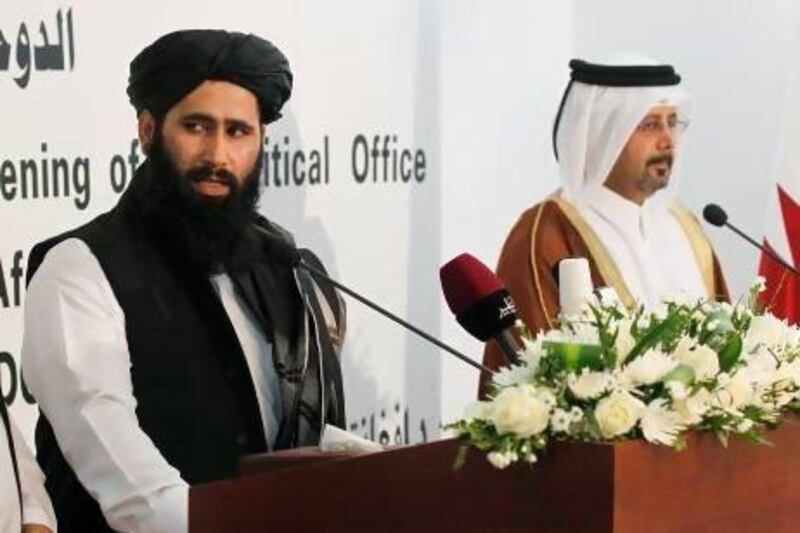KUWAIT CITY // The United States and the Afghan government will hold talks with the Taliban in Doha this week aimed at achieving peace in Afghanistan, officials said yesterday.
A bomb attack in Kabul hours before the announcement underscored the challenges facing the country as the US-led coalition prepares to transfer security to Afghan forces 12 years the Taliban government was toppled.
But officials said yesterday that the Taliban were expected to release a statement supporting the peace process and opposing the use of Afghan soil for attacks on other countries.
The news is also a diplomatic coup for Qatar, which first offered to host an office for the Taliban two years ago but had until recently been rejected as a mediator by the Afghan government.
"Afghanistan's High Peace Council will travel to Qatar to discuss peace talks with the Taliban," Afghanistan's president Hamid Karzai said in Kabul, referring to the council he formed in late 2010.
"We hope that our brothers the Taliban also understand that the process will move to our country soon."
US officials said the establishment of a Taliban office in Doha was the first step towards convincing it to renounce its links with Al Qaeda.
"The US will have its first formal meeting with the Taliban, and the first meeting with the Taliban for several years, in a couple of days in Doha," a senior US official said.
Mr Karzai spoke after a ceremony in which the international coalition marked the handover of security to Afghan forces.
Just hours earlier, a bomb in Kabul targeted a senior member of the peace council, highlighting concerns over how effectively the 352,000-strong Afghan security forces would be able to fight the insurgency when most foreign combat troops depart by the end of next year.
Mohammad Mohaqiq, a prominent Hazara politician, escaped unscathed from the attack but three people were killed and 21 wounded, a government official said.
"These talks reflect the concern of the US on Afghanistan," said Mahjoob Zwieri, professor of political science at Kuwait University. "They confirm that the American assessment of the situation is somewhat negative."
Dubbed "milestone 2013" by Nato, the security handover will culminate in the departure of all alliance troops serving in Afghanistan under the International Security Assistance Force (ISAF) force at the end of 2014.
Afghan security forces have been rapidly built up by the international coalition, from about 40,000 in 2009 to 352,000 in February this year.
Mr Karzai said other steps would follow the initial talks in the Qatari capital: that negotiations are moved to Afghanistan, that they bring about an end to violence, and that they do not become a tool for a "third country" to exploit Afghanistan, a veiled reference to Pakistan.
Many Afghan leaders say Pakistan is helping Taliban militants in Afghanistan, seeing them as a tool to counter the influence of its old rival, India.
An Afghan diplomatic source in Qatar said the opening of the Taliban office in Doha yesterday would "help start the peace talks again".
A team of envoys from the Taliban, which ruled Afghanistan from 1996 to 2001, flew to Qatar in early 2012 to open talks with the US government but the Taliban suspended the talks in March 2012, saying Washington was giving mixed signals on the Afghan reconciliation process.
More recently, Qatar sought to reopen the window for negotiation, but faced resistance from the Karzai government, which argued that any peace talks would have to take place in Afghanistan.
Those differences were apparently bridged earlier this year, when Mr Karzai visited Doha for the first time since the dispute erupted. He visited a second time last week, where he headlined a US-Islamic World Forum hosted by the Brookings Institution, an American think-tank.
Doha has a history of brokering peace talks, most recently in Darfur, Sudan, and in Lebanon. But some analysts had suggested that the country's support for new governments in Libya and Egypt could poison its ability to act as a neutral party.
"They can provide the space and the place and the logistics," said Ibrahim Sharqieh, deputy director of the Brookings Doha Centre.
"Qatar is responding to the interests and needs of the US and the Taliban to talk, while benefiting and capitalising on its ability to play a role."
edickinson@thenationl.ae
* With additional reporting from Reuters
twitter: For breaking news from the Gulf, the Middle East and around the globe follow The National World. Follow us





